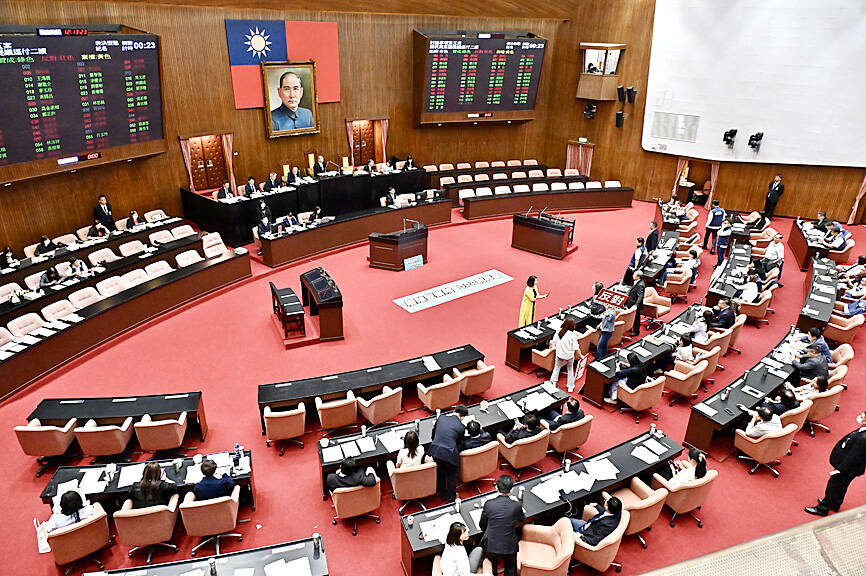The opposition-controlled legislature on Friday passed a motion to send a Chinese Nationalist Party (KMT) proposal to file an administrative lawsuit against the Central Election Commission (CEC) to a second reading without the need for a committee review.
The proposal would be pending caucus negotiations, in accordance with the Act Governing the Legislative Yuan’s Power (立法院職權行使法), Legislative Speaker Han Kuo-yu (韓國瑜) said.
Of the 111 lawmakers who attended Friday’s session, all but the Democratic Progressive Party’s (DPP) 51 legislators voted to pass the proposal.

Photo: George Tsorng, Taipei Times
The KMT initiated the legal action after the CEC late last month rejected its proposed referendum question asking whether judges should be allowed to impose the death penalty without a unanimous verdict.
The CEC had said it rejected the proposal because it contradicted a Constitutional Court ruling that requires unanimous decisions for death sentences.
The question also did not qualify as a major policy issue under the Referendum Act (公民投票法), it added.
KMT Legislator Niu Hsu-ting (牛煦庭) said the CEC was overriding public opinion and that the DPP was arbitrarily deciding which issues are eligible for a referendum.
A mid-January survey conducted by National Chung Cheng University’s Department of Criminology found that a record 87.97 percent of respondents opposed abolishing the death penalty.
Meanwhile, Taiwan People’s Party Legislator Chen Gau-tzu (陳昭姿) accused the CEC of “disregarding the rule of law.”
Under the Referendum Act, when a referendum question is proposed and passed by the legislature, the authority may directly hold a vote without a CEC review, Chen said.
DPP Legislator Chung Chia-pin (鍾佳濱) said administrative litigation applies only to CEC decisions for which a hearing has already been held.
Because there was no hearing regarding the CEC’s rejection of the proposed referendum, the legislature can only file an appeal, he said.
Referendums are limited to the creation or repeal of major policies, Chung said, citing the CEC’s explanation.
The proposed death penalty referendum involves the creation of foundational legislative principles and therefore falls outside the act’s scope, he said, adding that the opposition should seek to amend the Referendum Act instead.

Taiwan has received more than US$70 million in royalties as of the end of last year from developing the F-16V jet as countries worldwide purchase or upgrade to this popular model, government and military officials said on Saturday. Taiwan funded the development of the F-16V jet and ended up the sole investor as other countries withdrew from the program. Now the F-16V is increasingly popular and countries must pay Taiwan a percentage in royalties when they purchase new F-16V aircraft or upgrade older F-16 models. The next five years are expected to be the peak for these royalties, with Taiwan potentially earning

POSITIVE DEVELOPMENT: Japan and the US are expected to hold in-depth discussions on Taiwan-related issues during the meeting next month, Japanese sources said The holding of a Japan-US leaders’ meeting ahead of US President Donald Trump’s visit to China is positive news for Taiwan, former Japan-Taiwan Exchange Association representative Hiroyasu Izumi said yesterday. After the Liberal Democratic Party’s landslide victory in Japan’s House of Representatives election, Japanese Prime Minister Sanae Takaichi is scheduled to visit the US next month, where she is to meet with Trump ahead of the US president’s planned visit to China from March 31 to April 2 for a meeting with Chinese President Xi Jinping (習近平). Japan and the US are expected to hold in-depth discussions on Taiwan-related issues during the

‘LIKE-MINDED PARTNER’: Tako van Popta said it would be inappropriate to delay signing the deal with Taiwan because of China, adding he would promote the issue Canadian senators have stressed Taiwan’s importance for international trade and expressed enthusiasm for ensuring the Taiwan-Canada trade cooperation framework agreement is implemented this year. Representative to Canada Harry Tseng (曾厚仁) in an interview with the Central News Agency (CNA) said he was increasingly uneasy about Ottawa’s delays in signing the agreement, especially as Ottawa has warmed toward Beijing. There are “no negotiations left. Not only [is it] initialed, we have three versions of the text ready: English, French and Mandarin,” Tseng said. “That tells you how close we are to the final signature.” Tseng said that he hoped Canadian Prime Minister Mark Carney

STAY IN YOUR LANE: As the US and Israel attack Iran, the ministry has warned China not to overstep by including Taiwanese citizens in its evacuation orders The Ministry of Foreign Affairs (MOFA) yesterday rebuked a statement by China’s embassy in Israel that it would evacuate Taiwanese holders of Chinese travel documents from Israel amid the latter’s escalating conflict with Iran. Tensions have risen across the Middle East in the wake of US and Israeli airstrikes on Iran beginning Saturday. China subsequently issued an evacuation notice for its citizens. In a news release, the Chinese embassy in Israel said holders of “Taiwan compatriot permits (台胞證)” issued to Taiwanese nationals by Chinese authorities for travel to China — could register for evacuation to Egypt. In Taipei, the ministry yesterday said Taiwan